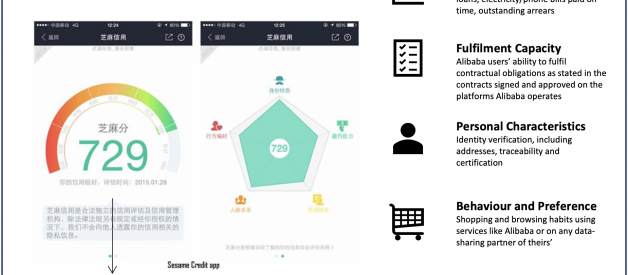Spin-doctors have worked on this story for two years now. A closer look at the corruptible incorruptible Social Credit system.
 The more gratuitous potshots we take at China, the less we choose to see behind the windowsill
The more gratuitous potshots we take at China, the less we choose to see behind the windowsill
To all of those that shared a meal with me over the last couple years, I am sorry. Sometimes I too, jump too readily onto the hype train, too ready to salivate over a sensational premise to keep a critical mind. You have all heard me making brushstroke comparisons between China?s new credit scoring systems (?Sesame Credit?) and Charlie Brooker?s depiction of a dystopian future dominated by score-based valuation in Nosedive.
A rewarding element of disciplined research enquiry is the frequent experience of being proven wrong. My initial foray into the topic depended on western Tech journals and political editorials, as well as the testimonies of a few concerned friends. Both sources of evidence suffer from similar blind spots. Access to valid and integral field-research is poor, as China remains a difficult country to navigate. Flying the sail of Western-label investigative journalism, particularly towards a Party promoted program like trust-score systems, is bound to lead to poor results. These sources also suffer from a tendency, even a desire, to fit the Sesame Credit story into a broader dichotomy narrative pitting individualistic freedom-loving America versus authoritarian machine-bureaucratic China.
When diving deeper into the reefs of China-based English-language sources, and sector-specific perspectives (mainly legal forums), the facts and their interpretations begin to point in a different direction to those allegations posed in the Western mainstream media. With this in mind, I recognise equally the subjective nature of China-based publication, as well as the narrow-focus of sector-specific content. True to our writing style, I will attempt to offer a balanced presentation.
Social Credit ? Sesame Credit
Defining Social Credit
First of all, let?s get our definitions straight. Sesame Credit or Zhima Credit is Ant Financial Services Group?s (formerly Alipay) private credit scoring and loyalty program service. What will be referred to as the ?Chinese social credit system? is a national ?trust-building? initiative that is currently being piloted until potential renewal in 2020, and some punishments on citizens have already been placed since 2018 (more to follow on this). ?Social credit? is referred-to by the Chinese government as a ?broad range of efforts to improve market security and public safety by increasing integrity and mutual trust in society?.
As detailed by China Law Translate, the phrase ?Social credit? ?may also suggest something different in English than in Chinese. It is a literal translation but might overemphasise interpersonal connections. Its real meaning is closer to ? societal? or ?the public? in different contexts.?
Purpose of Social Credit
The 2014 Social Credit System Construction Plan Outline (2014?2020), translated by China Law Translate , states main objective of social credit is to ensure compliance with legal obligations. The purpose of scoring citizens, companies and public institutions lies in a way to track the extent to which those follow existing laws. Deeper into the text do we find hints of how the social credit seeks to enforce compliance to laws. Phrased as a way to ?honour? trustworthiness and ?shame? untrustworthiness throughout Chinese society, social credit plans on using data from a wide network of private and public companies to help paint a picture of each citizen?s ?trustworthiness?. We are currently unsure of the companies making the final cut by 2020, but it?s obvious that at least those involved in the initial pilot programs (including tech unicorns Alibaba and Tencent) will be feeding data into the scoring system.
Early Developments 2014?2017
After setting the regulatory framework in 2014 at the national level, both regional governments and private sector companies were given the mandate to pilot different models of the scoring system.
If social credit is meant to enforce compliance to laws, those laws inevitably vary across regional governments and they vary even more in the ways compliance to such laws is measured.
The governments of Shanghai, Shangdong and Hubei all have different ways of crunching and collecting the data. The previously authorised commercial pilots also demonstrate great discrepancies in scoring methodology.
The national government?s actions clearly indicate a motivation to prototype several models (both authorised and commercial) at once before advocating for one particular version to be made official.
In 2017, it stated its will to ?adjust focus? and cracked-down on commercial pilots including the infamous Sesame Credit. In fact, Alibaba was accused of using the Sesame Credit program to reroute traffic into their websites.
In early 2018, Sesame Credit was formally disassociated from Social Credit when China had stopped allowing independent firms from providing credit ratings, instead differing to the newly created Baihang Credit Scoring. Nevertheless, the engineers behind Sesame Credit are indeed involved as technology partners charged with designing local government pilots.
Most of the Western media coverage of the event however lies about how the system was piloted.
Sesame Credit
To be clear, Sesame Credit is a loyalty program designed to boost good behavior and sales on Alibaba services. Imagine ?Amazon Rewards? granting you discounts and privileged access to all Amazon services depending on your credit history, identity verification, shopping/browsing behavior and your relationships with other Amazon users. Sesame Credit uses an algorithm that crunches data from five buckets, to produce a unique ?sesame score? which grants you access to Alibaba?s benefits program. Tencent Score is similar and uses WeChat as its main source of data.
 Image source ; Data source
Image source ; Data source
Effectively capturing the Western imagination was bold combination of traditional credit scoring criteria (credit history, contractual compliance, identity verification) with one?s social activities (their behaviour online, as well as the behaviour of their friends). Sparing you from a lengthy explanation of why this is ethically and democratically problematic, I invite you to read the following articles to see what I mean:
How China’s ‘social credit score’ will punish and reward citizens
By 2020, China plans to assign each of its 1.4 billion citizens a “social credit score” that will determine what people?
bigthink.com
Big data meets Big Brother as China moves to rate its citizens
On June 14, 2014, the State Council of China published an ominous-sounding document called “Planning Outline for the?
www.wired.co.uk
This Game Theory video makes a compelling case for the dark power of gamification
It is sensible to believe that Sesame Credit is the boldest (and perhaps most nefarious) attempt at manipulating user behaviour on the Internet. But it remains a privately-led initiative.
The Social Credit Data Structure
Western coverage
The most popular social-credit articles, such as WIRED?s Big Data Meets Big Brother piece spend over 80% of their word count on speculations of what Social Credit could or should do.
 sample western coverage (from left to right): Business Insider, Nature Research, WIRED and FT
sample western coverage (from left to right): Business Insider, Nature Research, WIRED and FT
They emphasise Social Credit?s potential in drawing conclusions on an individual?s ?trustworthiness? based on a magical ability to crunch the interactions between thousands of different data touch-points into actionable conclusions. Yes, the legislation passed by the Chinese government gives it access to an unprecedented amount of data, that is, if one goes by the number of technology partnerships it has forged with data providers. But data collection is only the first step in a long chain of actions required for the truly dystopian Black Mirror-esque vision to come into fruition.
System inputs, outputs and the black box
Its pilot programs reveal a different picture however. Below is a brief overview of social credit?s implementation by China?s provincial governments.

Merely a glance at the information inputs and action outputs is necessary to clarify the legal and compliance nature of the recent social credit pilots.
The inputs include conventional public credit information and safeguards to protect citizens from the unlawful collection of genetic, religious, or medical data. In fairness, there are a number of situations in Europe where governments can collect and use an individual?s medical and/or physiological information.
Market credit information, which includes data voluntarily provided by the private sector, causes more concern as soon as one realises how much data the two technology partners Alibaba and Tencent possess on any given individual. The content of the market credit information (sometimes including sensitive financial data) up for collection varies according to province, where Shanghai has a broader definition than Hebei (it allows companies to provide any information collected natively to be sent-in without consent).
The social credit system here looks for violations to contractual engagements or actions that help indicate the potential to violate a contractual engagement in future. After violations are found out, individuals stand to punishment, varying from being placed on a blacklist, imposed credit restrictions to falling victim to dissuasive justice. Examples include:
- Blacklist: Failure to pay taxes can lead to being placed on a ?No-Fly list? by the State Taxation Administration.
- Credit restrictions: Inability to acquire a loan to build a new restaurant if the individual has a history of poor food & hygiene test results
- Dissuasive Justice: Failure to pay for a parking ticket on multiple occasions and having one?s photo displayed visibly on the monitor of the parking lot facility and neighbouring bus stops
Corruptible Incorruptible System
Given these grave consequences, the scope of our investigation turns to how the information is collected. While sensational even at its best, VICE News? coverage of the Rongcheng social credit pilot helps expose the weaknesses of information collection.
As shown in the short video, the Chinese government relies on ?information collectors? (6 for a small village of 3000 inhabitants) who judge and record their neighbours? habits and actions in a little notebook. This notebook is said to help the government fill the gaps in public credit and market credit data that would inevitably exist. Public and market credit data cannot, for instance, monitor how an individual reacts to court ruling OR how a husband treats his wife at home (domestic violence).
These information collectors and other government officials in charge of inputting a citizen?s data and changing the variables behind social credit ?ratings? have great power and influence over their communities. In fact, the system judges not an individual?s credit worthiness or contractual trustworthiness, but in reality an individual?s trustworthiness in the eyes of social credit and credit rating agency officials.
This concentration of power can be argued from a Western perspective to be counter-intuitive to the original goals of social credit: to improve the trust environment in China. Indeed from a Western point of view, when the long-arm of the law is needed to enforce trust, there is no trust to speak of in the first place. There is indeed the danger of paradoxical corruption; corruption bourgeoning from the desire to exploit the social credit system for a government official or information collector?s personal gain. This system may spawn underground economies based on boosting an individual?s favour in the eyes of the State.
In China, a country historically suffering from endemic corruption, people hope that social credit will hold both companies and government officials accountable as well, the latter two being traditionally held above scrutiny. Only time will tell how strict social credit will be on powerful companies and government officials. For now, the system?s mainly been effective in providing new means for identifying and applying pressure to citizens on the edges of the law (the impoverished, the vandals, the ignorant).
So what?
Simply adding an additional tool for Communist officials and locally appointed investigators to wield seems like will not solve the corruption issue. In fact it will only continue the self-fulfilling curse by opening a new door for the destabilising force of systems prone to abuse and corrupt behaviour.
Technological chauvinism (Meredith Broussard) aside, this new government effort reveals a social problem in China that could prove more real, and therefore far scarier, than Black Mirror.
Endemic corruption as a symptom of the lack of an effective and truly reliable governance system in China at the regional and local levels. China has known historically record-breaking advances at the national and international level, but has had trouble translating these into concrete progress at finer levels of governmental granularity.
A tool cannot solve the deeper structural issue, provided it fails to address the key problematic nodes of the corruptible system.
Further reading
No, China isn’t Black Mirror – social credit scores are more complex and sinister than that
What a gift Charlie Brooker’s dystopian series Black Mirror has been to journalists: any time a reporter covers a story?
www.newstatesman.com
Does China’s bet on big data for credit scoring work?
When Ant Financial launched its credit scoring system, Sesame Credit, in January 2015, it said the data-driven product?
www.ft.com
Ant Financial denies use of Equifax IP to develop Sesame Credit rating system
Your source for credible news and authoritative insights from Hong Kong, China and the world.
www.scmp.com
Social Credit Articles :
ALL TRANSLATIONS ON THIS SITE ARE UNOFFICIAL AND ARE PROVIDED FOR REFERENCE PURPOSES ONLY. THESE TRANSLATIONS ARE?
www.chinalawtranslate.com
China’s social credit systems are highly popular – for now
China’s plan to introduce a nation-wide Social Credit System (SCS) by 2020 has been widely debated. Media headlines?
www.merics.org
Other sources
Kubrick Group, ?Zhima Credit: How would you rank??
Extra Credits, ?Propaganda Games: Sesame Credit- the true danger of gamification?
Business Insider, ?China Social Credit System: Punishments and Rewards Explained?
Branding in Asia, ?Understanding China?s Social Credit System?
China Digital Times, ?Carrot & Stick: China?s Social Credit System?
Xinhua Net, ?China Focus: Chinese courts use technology to tighten noose on debt defaulters?
WIRED, ?Big data meets Big Brother as China moves to rate its citizens?
China copyright and media, ?Opinions concerning Accelerating the Construction of Credit Supervision, Warning and Punishment Mechanisms for Persons Subject to Enforcement for Trust-Breaking?
China Daily.com.cn, ?Zhima Credit makes visa applications easier?
Financial Times, ?China penalises 6.7m debtors with travel ban?
Science Nordic, ?Is China?s social credit system really the dystopian sci-fi scenario many fear??
France 24 English, ?China introduces ?social credit? for citizens?
CBS This Morning, ?China?s social credit score bans some from travel?
China Law Translate, ?Seeing Chinese social credit through a glass darkly?
China Law Translate, ?Giving Credit 3: Inputs and Outputs?


